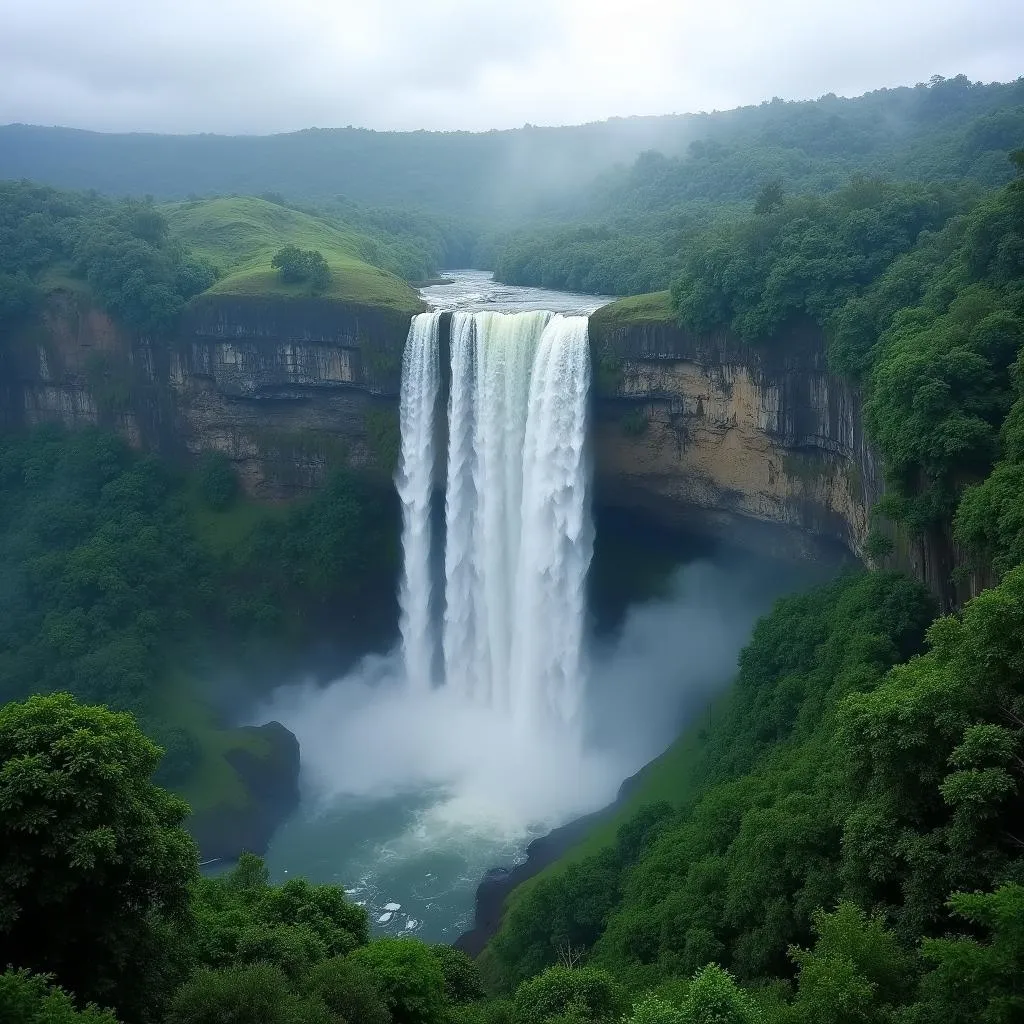In IELTS Speaking tests, candidates are often asked to describe places, including cities they would like to live in. This topic allows examiners to assess your ability to articulate preferences, describe locations, and express opinions coherently. Let’s explore how to effectively tackle this common IELTS Speaking topic and maximize your score.
Part 1: Introduction and Interview
In Part 1, the examiner may ask general questions about cities and your preferences. Here are some potential questions and sample answers:
Q: Do you like living in cities?
Band 6-7 Answer:
“Yes, I do enjoy living in cities. They offer many conveniences and opportunities that smaller towns don’t have. There’s always something to do, and I like the energy of urban areas.”
Band 8-9 Answer:
“Absolutely. I’m quite fond of urban living. The vibrant atmosphere, cultural diversity, and abundance of career opportunities make cities incredibly appealing to me. That said, I do acknowledge that city life comes with its own set of challenges, such as higher living costs and increased stress levels.”
Q: What are some advantages of living in a big city?
Band 6-7 Answer:
“Big cities have many advantages. There are more job opportunities, better public transportation, and a wider variety of entertainment options. You can also meet people from different backgrounds, which is interesting.”
Band 8-9 Answer:
“The advantages of metropolitan living are manifold. Firstly, big cities are often economic hubs, offering a plethora of career opportunities across various industries. Additionally, they boast superior infrastructure, including efficient public transportation systems and world-class healthcare facilities. Moreover, the cultural diversity in large urban centers provides an enriching environment for personal growth and broadens one’s perspective.”
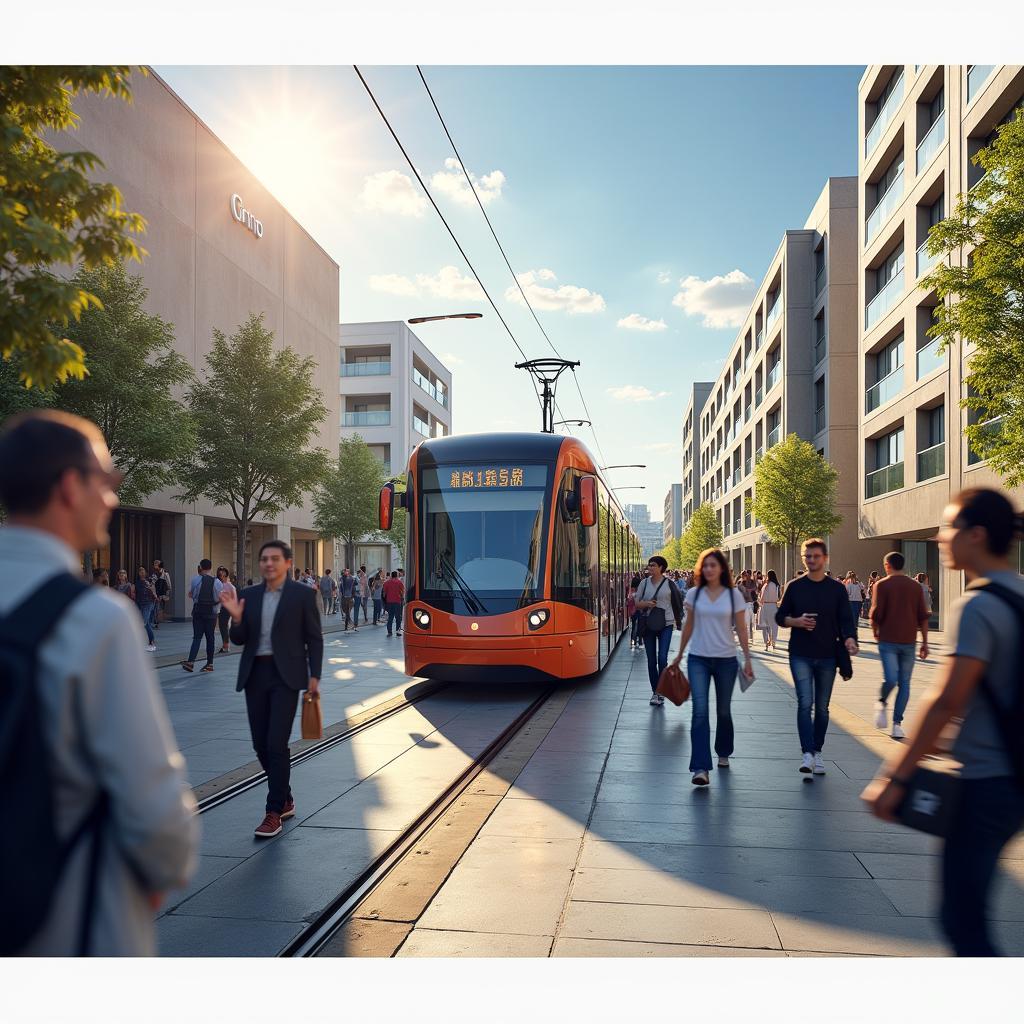 Multiple advantages of living in a big city including career opportunities and cultural diversity
Multiple advantages of living in a big city including career opportunities and cultural diversity
Part 2: Long Turn
Cue Card:
Describe a city you would like to live in.
You should say:
- Where this city is located
- What you know about this city
- Why you would like to live there
- And explain how this city is different from where you currently live
Band 6-7 Answer:
“I’d like to talk about Vancouver, a city in western Canada. It’s located on the Pacific coast of British Columbia. I know that Vancouver is known for its beautiful natural surroundings, with mountains and the ocean nearby. The city has a mild climate compared to other parts of Canada, which is nice.
I would like to live there because of the high quality of life it offers. Vancouver consistently ranks as one of the most livable cities in the world. It has a good balance of urban amenities and access to nature, which appeals to me. The city is also known for its diverse population and multicultural atmosphere.
Vancouver is quite different from where I currently live. My city is inland and doesn’t have the same access to both mountains and the ocean. Vancouver also seems to have a more relaxed lifestyle and a stronger focus on outdoor activities and environmental sustainability, which I find attractive.”
Band 8-9 Answer:
“I’d be delighted to describe Vancouver, a captivating metropolis nestled on the west coast of Canada, specifically in the province of British Columbia. This cosmopolitan gem is renowned for its breathtaking juxtaposition of urban sophistication and natural splendor, with the Coast Mountains forming a majestic backdrop to the city’s sleek skyline, while the Pacific Ocean laps at its shores.
Vancouver has garnered a reputation as a paragon of livability, consistently ranking among the world’s most desirable cities. Its temperate climate is a stark contrast to the harsh winters experienced in other Canadian regions, making it an appealing destination year-round. The city’s commitment to sustainability is evident in its green initiatives and extensive network of parks and cycling lanes.
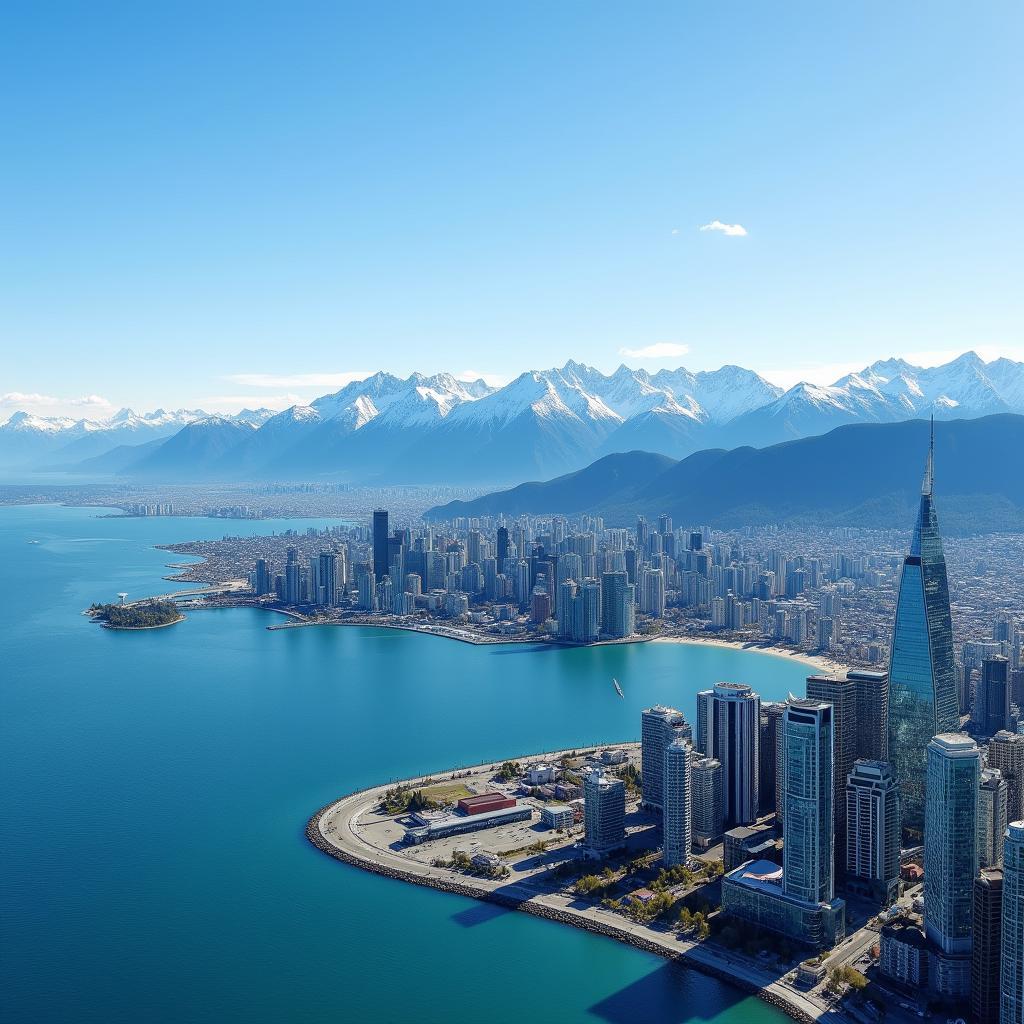 Stunning panoramic view of Vancouver's skyline with majestic mountains and the Pacific Ocean
Stunning panoramic view of Vancouver's skyline with majestic mountains and the Pacific Ocean
My attraction to Vancouver stems from its harmonious blend of career opportunities, cultural diversity, and outdoor recreational possibilities. The city’s thriving film industry, burgeoning tech sector, and status as a major Pacific Rim port create a dynamic economic environment. Moreover, its multicultural tapestry is reflected in its vibrant neighborhoods, eclectic culinary scene, and inclusive social fabric.
Compared to my current place of residence, Vancouver stands out in several aspects. While my city is landlocked, Vancouver offers the unique luxury of being able to ski in the mountains and sail in the ocean on the same day. The emphasis on work-life balance and outdoor pursuits in Vancouver is also more pronounced. Additionally, the city’s progressive policies on environmental conservation and urban planning set it apart as a forward-thinking metropolis, which aligns closely with my personal values and aspirations for sustainable living.”
Follow-up questions:
- How has the city changed over the years?
- What challenges might you face living in this city?
Band 6-7 Answer:
- “Vancouver has grown a lot over the years. It’s become more diverse and more expensive. The skyline has changed with new buildings, and there’s been more focus on making the city environmentally friendly.”
- “The main challenge would probably be the high cost of living. Housing in Vancouver is very expensive. Also, adjusting to the rainy weather might be difficult for me.”
Band 8-9 Answer:
- “Vancouver has undergone a remarkable transformation over the past few decades. The city has experienced significant urban development, with its skyline evolving dramatically through the construction of numerous high-rise buildings. There’s been a notable shift towards sustainability, with the implementation of green building practices and expansion of public transit options. The demographic landscape has also changed, with increased immigration contributing to a more diverse and multicultural society. However, this growth has brought challenges, particularly in terms of housing affordability and income inequality.”
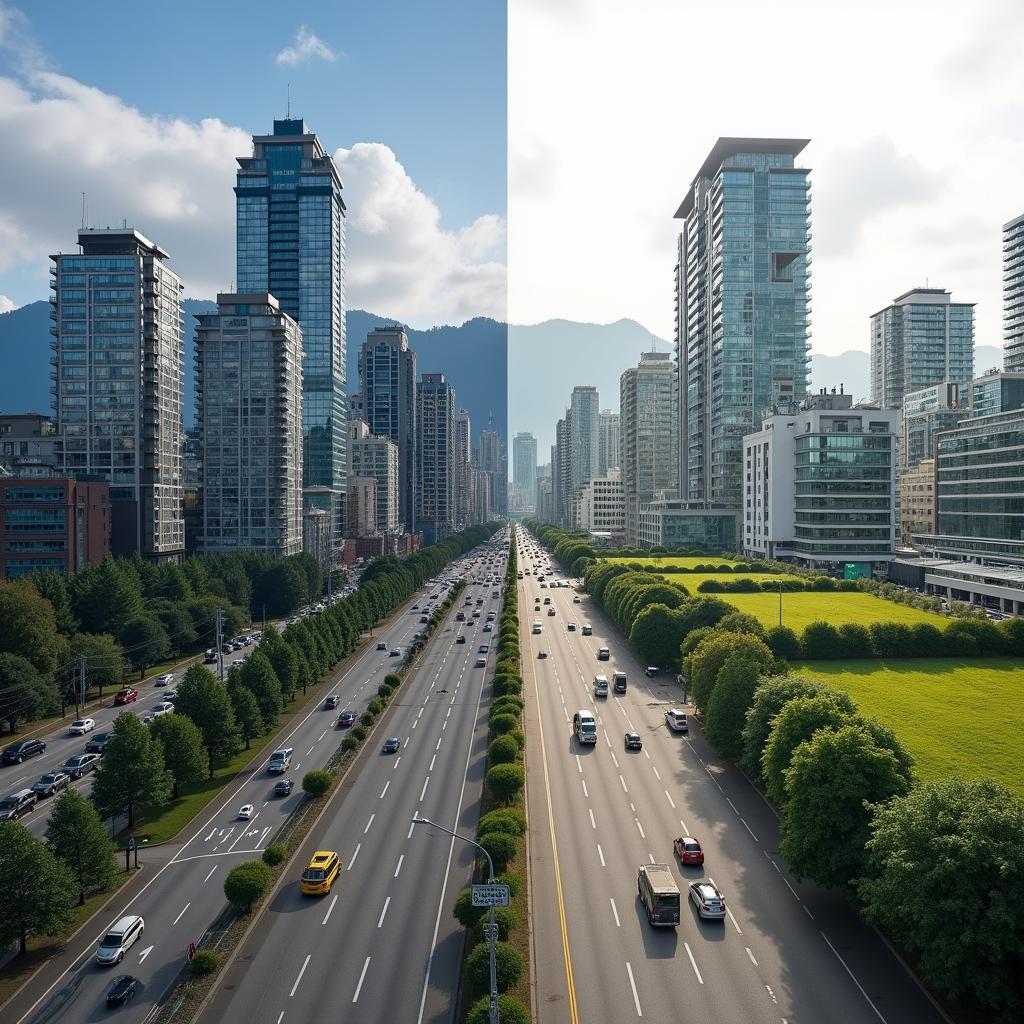 Vancouver's urban development showing skyline transformation and commitment to sustainability
Vancouver's urban development showing skyline transformation and commitment to sustainability - “Living in Vancouver would present several challenges. The most pressing issue would undoubtedly be the exorbitant cost of living, particularly in terms of housing. Vancouver’s real estate market is notoriously expensive, which could necessitate financial compromises or living farther from the city center. Additionally, adapting to the city’s frequently overcast and rainy climate might prove challenging, especially coming from a region with different weather patterns. Lastly, while Vancouver’s popularity as a desirable destination is a testament to its qualities, it also means facing increased competition in the job market and potential overcrowding in popular areas.”
Part 3: Two-way Discussion
Q: How do you think cities will change in the future?
Band 6-7 Answer:
“I think cities in the future will become more technologically advanced. We’ll probably see more smart buildings and better public transportation. Cities might also focus more on being environmentally friendly, with more green spaces and renewable energy use.”
Band 8-9 Answer:
“The evolution of cities in the future is likely to be multifaceted and transformative. I anticipate a significant shift towards smart city technologies, with the integration of Internet of Things (IoT) devices to optimize urban functions such as traffic management, waste disposal, and energy consumption. This digital transformation will likely lead to more efficient and responsive urban environments.
Furthermore, I expect a greater emphasis on sustainability and resilience in urban planning. This could manifest in the form of green architecture, increased use of renewable energy sources, and the development of urban farming initiatives to promote food security. The concept of the ’15-minute city’, where all essential services are within a short walk or bike ride, may gain more traction, promoting more localized and sustainable living.
Additionally, as remote work becomes more prevalent, we might see a reconfiguration of urban spaces, with less emphasis on centralized business districts and more focus on creating mixed-use neighborhoods that blend residential, commercial, and recreational areas. This could lead to more balanced and livable urban environments.
Lastly, given the increasing frequency of extreme weather events due to climate change, future cities will likely prioritize climate adaptation strategies. This could include the development of flood-resistant infrastructure, heat-mitigation measures, and more robust emergency response systems.”
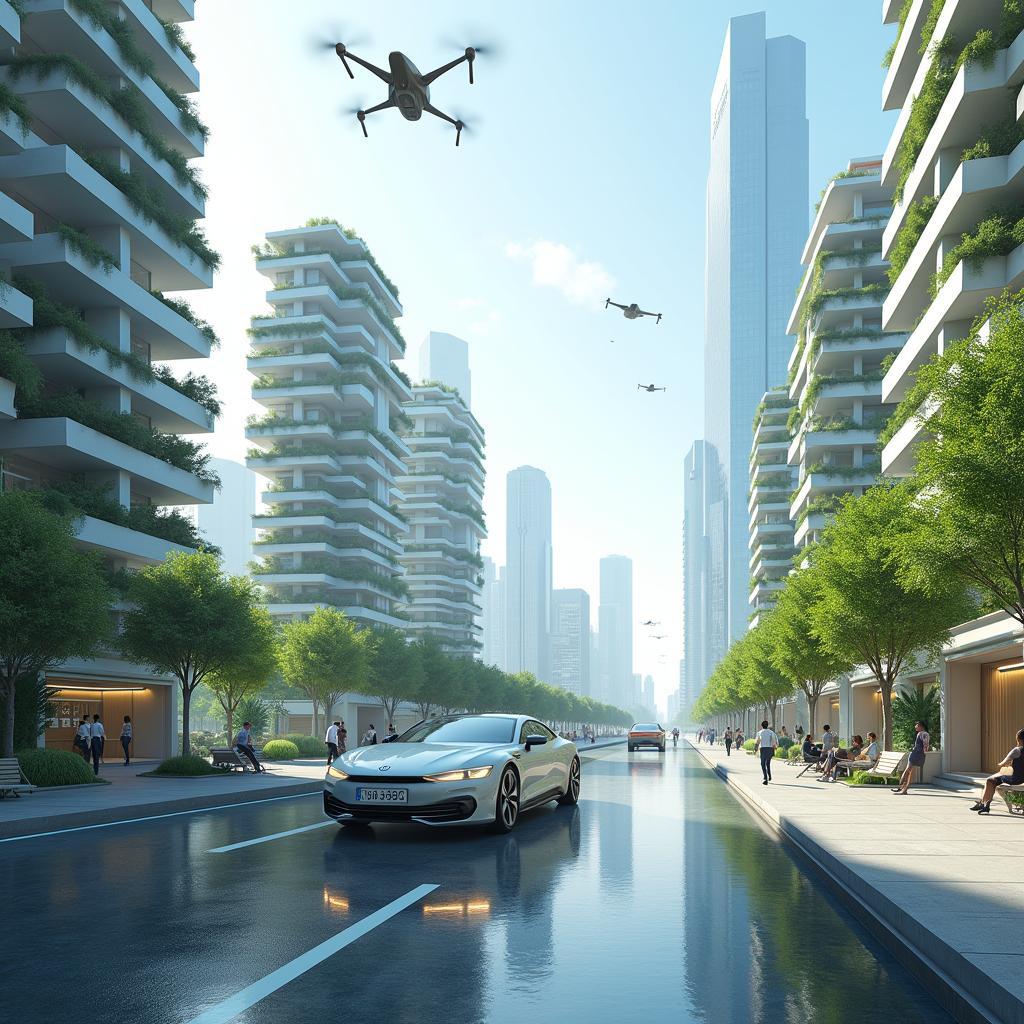 Vision of a futuristic city with smart technology, green architecture, and sustainable living
Vision of a futuristic city with smart technology, green architecture, and sustainable living
Q: Do you think it’s better to preserve old buildings in cities or replace them with modern ones?
Band 6-7 Answer:
“I think it’s important to have a balance. Old buildings are part of a city’s history and culture, so we should try to preserve some of them. But modern buildings are often more efficient and can meet current needs better. Maybe we can preserve the most important old buildings and replace others with modern ones.”
Band 8-9 Answer:
“This is a nuanced issue that requires careful consideration of various factors. On one hand, preserving historical architecture is crucial for maintaining a city’s cultural identity and heritage. These buildings often possess unique aesthetic qualities and tell the story of a city’s evolution over time. They can also be significant tourist attractions, contributing to the local economy.
On the other hand, modern buildings often offer superior functionality, energy efficiency, and can better accommodate the needs of a growing urban population. They can be designed to withstand natural disasters more effectively and often provide more accessible spaces for people with disabilities.
I believe the ideal approach is to strike a thoughtful balance between preservation and modernization. This could involve adaptive reuse of historical buildings, where the exterior is preserved while the interior is modernized to meet current standards and needs. In cases where old buildings are beyond repair or lack significant historical or architectural value, replacement with modern structures could be considered.
Moreover, when new buildings are constructed, they should be designed with sensitivity to the existing urban fabric, ensuring they complement rather than clash with the surrounding architecture. This approach allows cities to honor their past while still evolving to meet the demands of the future.
Ultimately, each case should be evaluated individually, considering factors such as the building’s historical significance, structural integrity, and the city’s overall urban development strategy. The goal should be to create a harmonious urban landscape that respects history while embracing progress.”
Key Vocabulary and Phrases for High Scores
- Cosmopolitan (adjective) /ˌkɒzməˈpɒlɪtən/: Including people from many different countries.
Example: “New York is known for its cosmopolitan atmosphere.” - Infrastructure (noun) /ˈɪnfrəstrʌktʃə(r)/: The basic systems and services that a country or organization uses in order to work effectively.
Example: “The city has invested heavily in improving its transportation infrastructure.” - Sustainability (noun) /səˌsteɪnəˈbɪləti/: The ability to continue over a period of time.
Example: “Many modern cities are focusing on environmental sustainability.” - Urban planning (noun phrase) /ˈɜːrbən ˈplænɪŋ/: The process of designing and organizing urban areas.
Example: “Effective urban planning is crucial for creating livable cities.” - Quality of life (noun phrase) /ˈkwɒləti əv laɪf/: The standard of health, comfort, and happiness experienced by an individual or group.
Example: “Vancouver is known for its high quality of life.”
Describe a store where you often shop to practice more IELTS speaking topics that may come up in your test.
Examiner’s Advice
To achieve a high score in the IELTS Speaking test when describing a city:
- Use a wide range of vocabulary related to urban living, including less common words and phrases.
- Demonstrate your ability to use complex grammatical structures accurately.
- Organize your ideas logically and coherently, especially in Part 2’s long turn.
- Provide specific examples and personal experiences to support your points.
- Show awareness of broader issues related to urban development and city living in Part 3.
- Practice speaking fluently and confidently about various aspects of cities.
Remember, regular practice and exposure to English through various media can significantly improve your speaking skills. Consider discussing different cities and urban issues with others to broaden your perspective and vocabulary.
Describe a famous person you want to meet in the future for more practice on describing people, which can be useful when talking about city residents or notable figures associated with a city.
By following these guidelines and practicing regularly, you can enhance your ability to articulate your thoughts about cities effectively in the IELTS Speaking test.
